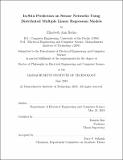| dc.contributor.advisor | Daniela Rus. | en_US |
| dc.contributor.author | Basha, Elizabeth (Elizabeth Ann) | en_US |
| dc.contributor.other | Massachusetts Institute of Technology. Dept. of Electrical Engineering and Computer Science. | en_US |
| dc.date.accessioned | 2010-12-06T16:36:13Z | |
| dc.date.available | 2010-12-06T16:36:13Z | |
| dc.date.copyright | 2010 | en_US |
| dc.date.issued | 2010 | en_US |
| dc.identifier.uri | http://hdl.handle.net/1721.1/60096 | |
| dc.description | Thesis (Ph. D.)--Massachusetts Institute of Technology, Dept. of Electrical Engineering and Computer Science, 2010. | en_US |
| dc.description | This electronic version was submitted by the student author. The certified thesis is available in the Institute Archives and Special Collections. | en_US |
| dc.description | Cataloged from student submitted PDF version of thesis. | en_US |
| dc.description | Includes bibliographical references (p. 199-208). | en_US |
| dc.description.abstract | Within sensor networks for environmental monitoring, a class of problems exists that requires in-situ control and modeling. In this thesis, we provide a solution to these problems, enabling model-driven computation where complex models are replaced by in-situ sensing and communication. These prediction models utilize low-computation, low-communication, and distributed algorithms suited to autonomous operation and multiple applications. We achieve this through development of new algorithms that enable distributed computation of the pseudo inverse of a matrix on a sensor network, thereby enabling a wide range of prediction methods. We apply these models to three different application areas: (1) river flooding for early warning, (2) solar recharging current for power management, and (3) job congestion prediction on multi-function device networks for achieving quality of service. Additionally, we use these applications to explore other aspects of sensor networks: river flooding to design a predictive environmental monitoring sensor network, solar current to develop a dynamic version of the model for better fault tolerance, and job congestion to explore modeling multi-function device networks. For each, we comprehensively tested the full solutions. We implemented the river flood prediction and solar current prediction solutions on two different sensor network platforms with full field deployments; we had a final test of over 5 weeks operation for both. Overall, we achieve the following contributions: (1) distributed algorithms for computing a matrix pseudoinverse and multiple linear regression model on a sensor network, (2) three applications of these algorithms with associated field experiments demonstrating their versatility, (3) a sensor network architecture and implementation for river flood prediction as well as other applications requiring real-time data and a low node count to geographic area ratio, and (4) a MFD simulator predicting and resolving congestion. | en_US |
| dc.description.statementofresponsibility | by Elizabeth Ann Basha. | en_US |
| dc.format.extent | 208 p. | en_US |
| dc.language.iso | eng | en_US |
| dc.publisher | Massachusetts Institute of Technology | en_US |
| dc.rights | M.I.T. theses are protected by
copyright. They may be viewed from this source for any purpose, but
reproduction or distribution in any format is prohibited without written
permission. See provided URL for inquiries about permission. | en_US |
| dc.rights.uri | http://dspace.mit.edu/handle/1721.1/7582 | en_US |
| dc.subject | Electrical Engineering and Computer Science. | en_US |
| dc.title | In-situ prediction on sensor networks using distributed multiple linear regression models | en_US |
| dc.type | Thesis | en_US |
| dc.description.degree | Ph.D. | en_US |
| dc.contributor.department | Massachusetts Institute of Technology. Department of Electrical Engineering and Computer Science | |
| dc.identifier.oclc | 679616439 | en_US |
